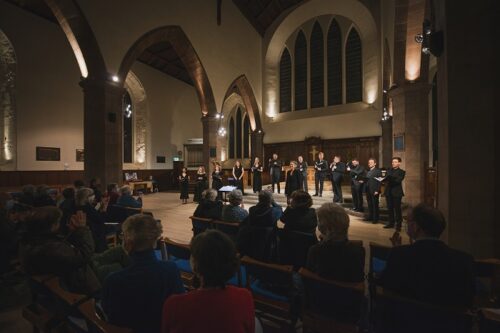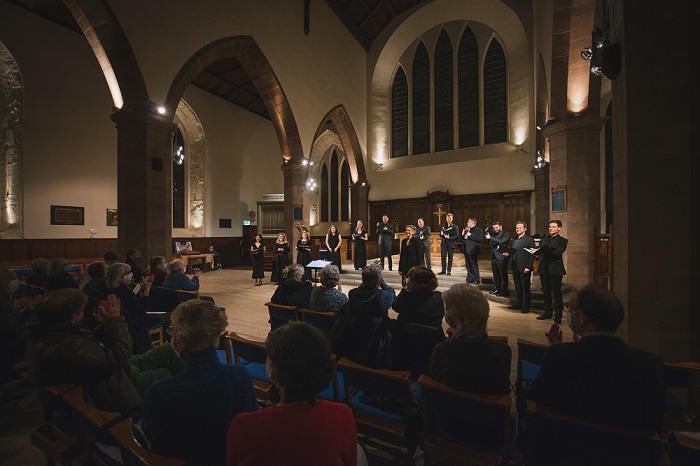 United Kingdom Purcell, Johnson, Grieg, Hammond, Holten, MacMillan: Dunedin Consort / Grete Pedersen (conductor). Greyfriars Kirk, Edinburgh, 15.10.2021. (SRT)
United Kingdom Purcell, Johnson, Grieg, Hammond, Holten, MacMillan: Dunedin Consort / Grete Pedersen (conductor). Greyfriars Kirk, Edinburgh, 15.10.2021. (SRT)

Purcell & Sandström – Hear my prayer, O Lord
Robert Johnson – Deus misereatur nostril
Anon. – Descendi in hortum meum
Grieg – Ave maris stella
Drew Hammond – Yince a paradise
Bo Holten – Rain and Rush and Rosebush
Trad. – Norwegian & Scottish Folksong
Unless fuel anxiety has limited your consumption of the news to price rises and toy shortages, you are bound to have noticed that the COP-26 climate conference takes place in Glasgow next month. Outside of Scotland, interested groups are thinking deeply about who is going to show up and how they will limit the impact of humans on the climate so as to create a more sustainable future. Inside Scotland, people are more likely to be talking about the filthy state of Glasgow’s streets and the likelihood of a transport strike during the conference.
Let us stick to the high-minded, though, because it turns out that COP-26 can also inspire art. This concert saw a restart to the Dunedin Consort’s season of in-person concerts (hooray!), and their a cappella programme centred around a new commission; a Scots poem by Isobel McArthur reflecting on mankind’s damage to the natural world, set to music by Drew Hammond. Yince a paradise draws its title from a line in McArthur’s poem where a child asks, ‘Is it true that aw this ash an reek/Wis yince a paradise?’
It is a striking line for a powerful reflection on man’s degradation of nature, and Hammond’s music is fits it very effectively. The opening chords seem to slide down the stave as though melting, perhaps reflecting the decay of the natural world, while harsh contours accompany the statements of regret at what man has done. The choral textures are densely packed at times, unforgiving in places, and the abrupt ending seems to hang in the air as though heavy with the weight of an unanswerable question of responsibility.
It works, though, not least because these singers are so good. The choir of twelve (three of each voice type) sang with the tightest blend and the most persuasive sense of communication, something that had me convinced throughout this programme, which spanned five centuries of choral music. Their Renaissance polyphony sounded uncommonly full for only twelve singers, built as it was on an unusually rich bass line, while Grieg’s Ave maris stella rang with direct clarity in its open textures.
With a Norwegian director, it is natural that the programme should feature so many Nordic composers, but there was never any sense of sameness or uniformity in Grete Pedersen’s selection of music. Bo Holten’s Rain and Rush and Rosebush was a brilliant piece of drama, setting a text of Hans Christian Andersen that asks big questions of life but finds that the answers are rather simple. Holten’s music is gripping in its use of contrasts, with certain lines of text sticking out like milestones, while garish vocal mannerisms give way to rhapsodic melismas, resolving into something confidently optimistic by the end. The Dunedin singers also created something magical in their opening number, where Purcell’s seventeenth-century clarity is slowly pulled apart by the anxiety of Sven-David Sandström’s contemporary harmonies.
The most magical thing on the programme, however, came in a series of Scottish and Norwegian folk songs at the end, sung by the choir dispersed around the church with Pedersen conducting in the middle. The spatial effect worked because it was deployed subtly, never as a gimmick, which made it so much more effective. The music seemed gently to emerge from every corner of Greyfriars Kirk at once, Pedersen conducting as though she was weaving an improvisation out of thin air, with subtle vocalisations creating a spellbinding sound, especially in James MacMillan’s setting of Rabbie Burns’s The Gallant Weaver. In the final Norwegian song, sung as though it were plainchant, it scarcely mattered that the choir’s unanimity came and went, as on this occasion it felt like part of the music’s authenticity.
Simon Thompson
